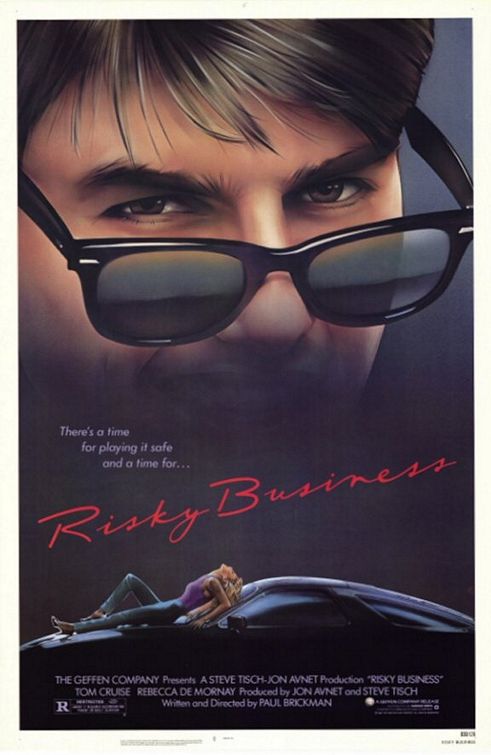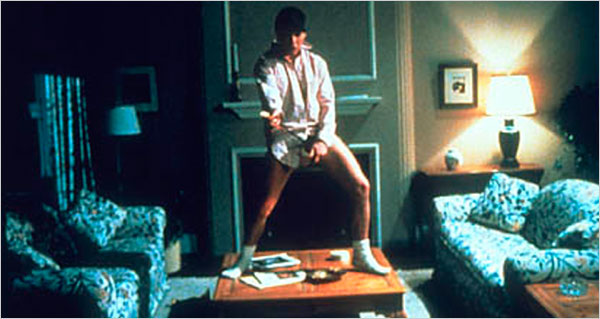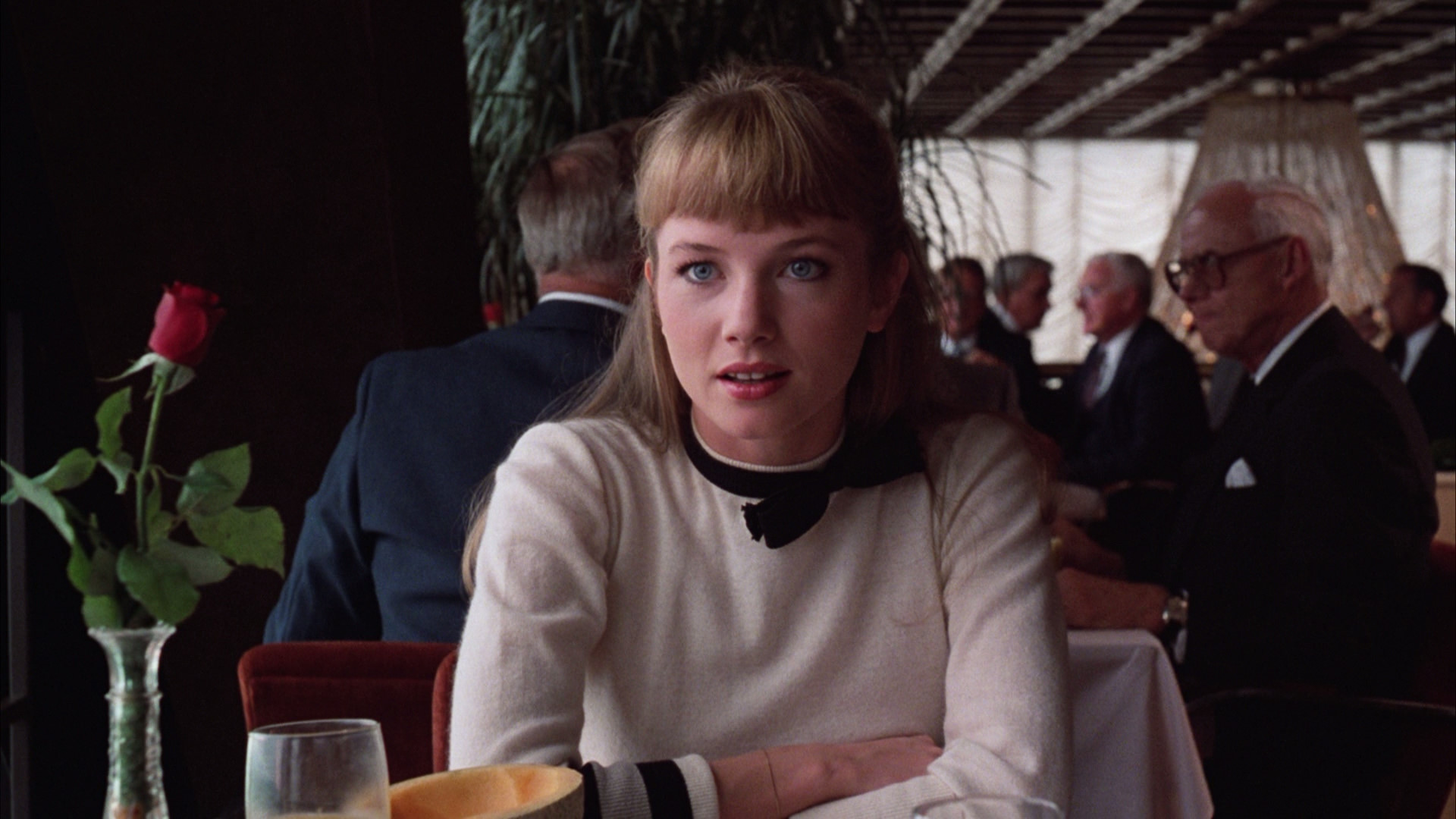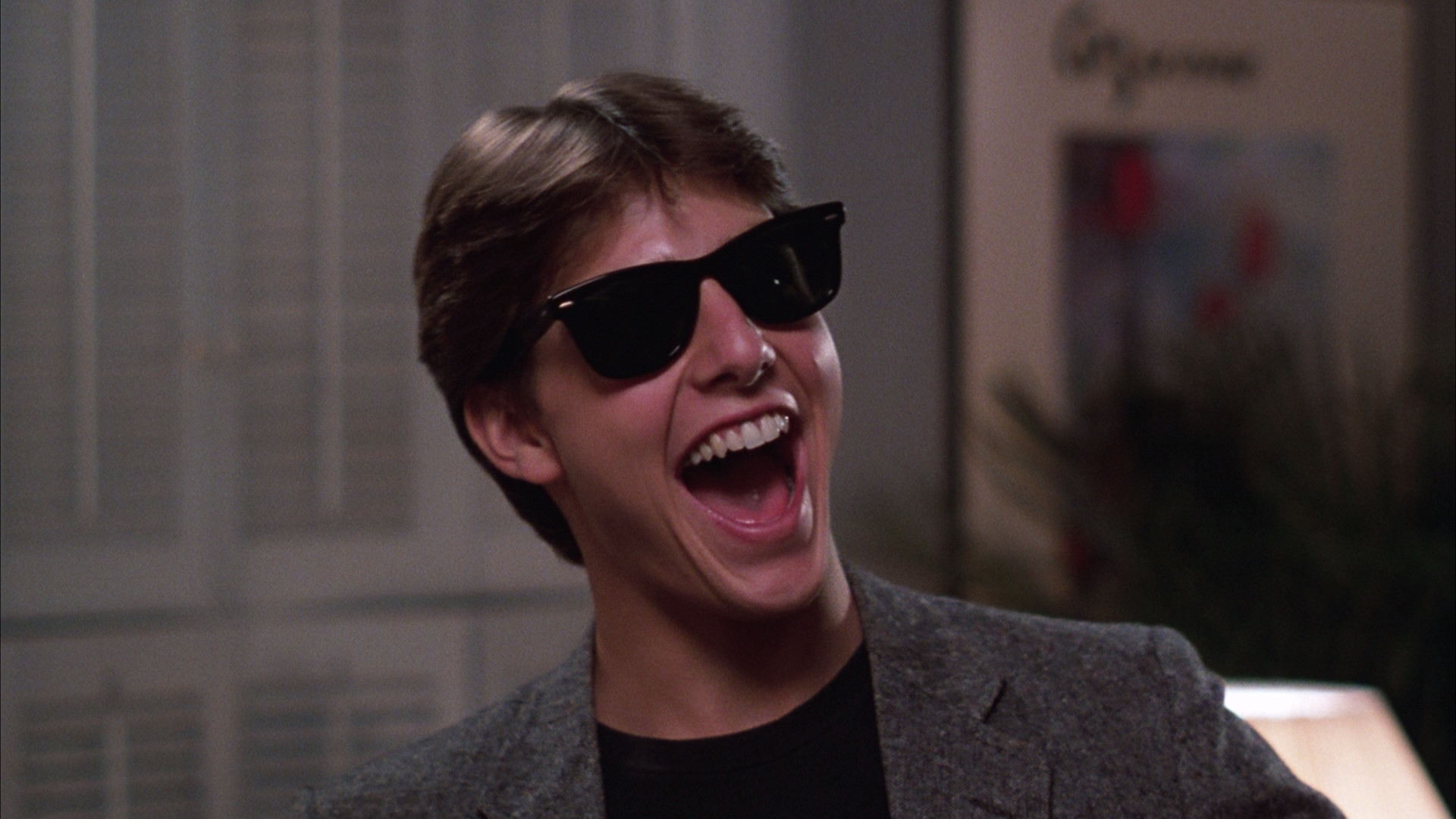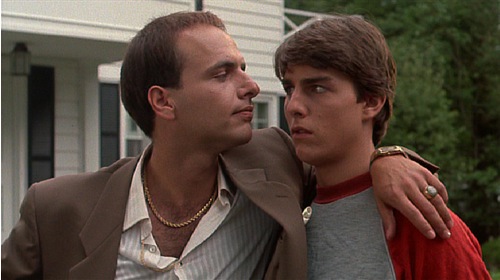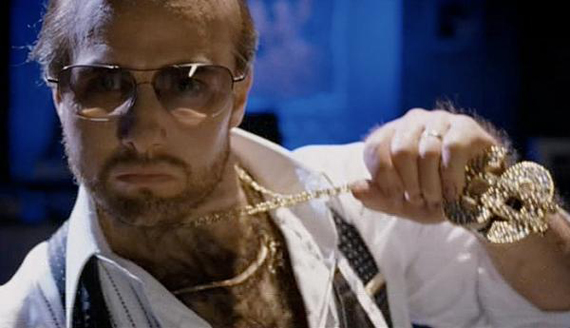The Actors Chewdio was established in 1984 by founding members (and legendary thespians) Francois Van Varenberg, Charles Buchinsky, Michael Gardenzio, Kurt Vogel, and Thomas Mapother. Since its inception, The Actors Chewdio has been a shining beacon of quality within the acting community; producing exemplary performers at a level of talent and professionalism that all others aspire to reach. The organization is lead today by Chairman Hans Lundgren and it is with his gratuitous blessing that we bring you this procession of literary specimens aimed at enlightening lesser folk to the entire cinematic history of the craft’s innumerable transcendent masters…one film at a time!
The Film: Risky Business (1983)
Director: Paul Brickman
Writer: Paul Brickman
Thespians: Tom Cruise, Rebecca De Mornay, Joe Pantoliano, Bronson Pinchot, Richard Masur, Curtis Armstrong, Nicholas Pryor, Janet Carroll, Shera Danese, Raphael Sbarge, Bruce A. Young, Fern Persons, etc.
Running Time: 98 minutes
Budget: $6,200,000
Theatrical Performance: $63,541,777
If my first leading role made 10x its budget on the big screen, I’d take off my pants and dance around too! Doubly so when said film is a legitimate classic. Tom Cruise is Joel Goodson, a high school senior stressed from top to bottom about getting into a good college and his overall future in general. His parents are of the mind that school should be his only priority and seem to treat him like a toddler. His friends think he should loosen up and just say, “What the fuck!” every once in awhile and have a good time. Joel himself falls somewhere in between; wanting both but seemingly unable to accomplish either task. A similar scenario hit screens a few years later in the form of the extremely optimistic and happy-go-lucky Ferris Bueller’s Day Off. Paul Brickman’s Risky Business is basically its dark companion. The shenanigans and good times are almost in equal measure here, but there is a dark undercurrent to this film that is not present in the Matthew Broderick opus. The POV shots of Joel sheepishly dealing with his parents and his odd pessimistic dreams have an almost slasher-esque vibe to them. This is further driven home by a rather haunting Tangerine Dream score that permeates throughout the film, with occasional musical levity in the form of rock music (i.e. the Bob Seger-fueled iconic dance).
Moving back to the plot, Joel Goodson’s own Ferris Bueller comes in the form of Curtis Armstrong’s Miles, who pleads with his pal to take it easy and live a little. For better or worse, Joel begins to listen. When his parents leave town on a trip, Joel slowly takes matters into his own hands. His rebellion comes in baby steps. First our “good son” acts out by having a whiskey and Coke with his TV dinner. Then comes the aforementioned dance routine, which involves Joel screwing with his father’s precious equalizer settings on the sound system. And finally the decision that changes everything for our reluctant revolutionary: he orders a prostitute. When Joel doesn’t have enough cash the next morning to cover their transaction, Lana (Rebecca De Mornay) takes an expensive sculpture as collateral. Joel is furious and, with the help of Miles, tracks her down. One thing leads to another and Joel finds himself speeding down the highway in his father’s Porsche (which he isn’t supposed to be driving) with Miles and Lana as his passengers and Lana’s volatile gun-toting pimp Guido (Joey Pants) in hot pursuit. Miles, who previously advocated Joel being reckless from time to time, is livid as a result of the evening’s events. Joel, however, is ecstatic with the sense of freedom it has awakened within him. And the adventure has only begun!
Tom Cruise not only sells every minute of Joel’s journey from nervous introvert to confident extrovert, but the supporting cast are equally great in their roles. Writer/director Paul Brickman nary hits a wrong note within either of his two big roles in the production; deftly juggling both the light and dark themes within…particularly the much bleaker original ending. According to Bronson Pinchot (who plays another of Joel’s friends), Tom carried himself on set as though he flatout KNEW that this film would make him a star. Whether that is arrogance or not, he was absolutely right. He hit that magical sweet spot of being the perfect guy in the perfect film released at the perfect time and the rest is history. Pinchot and the others may not have realized this at the time, but I refuse to believe that Brickman and the studio couldn’t see it immediately.
CC: In Risky Business, Paul Brickman took the youth-oriented genre and really opened it up visually and musically. It’s been very influential. Were these elements part of the movie from the beginning?
TC: Yes. Francis offered everybody a chance to go on and do Rumble Fish the same week I was offered Risky Business. I thought Paul Brickman was a very bright man with great taste. He knew exactly what the movie was going to be.
CC: What was your audition like?
TC: I was doing The Outsiders in Tulsa, and I had to come back to Los Angeles for a day for some reason. Originally, Paul had seen Taps and said, “This guy for Joel? This guy is a killer! Let him do Amityville III!” Somehow, my agent, without me knowing, arranged to have me just drop by the office to say hello. So I went in wearing a jean jacket, my tooth was chipped, my hair was greasy. I was pumped up and talking in an Oklahoma accent, “Hey, how y’all doing?” Paul just sat there, looking at me. He said, “Let’s just read a little bit.” I’m not a very good cold reader. What I do is start with a line and go off and ad-lib and kind of find my way down the script. I started reading the thing, and they were ready to say, “Okay, thank you.” I didn’t know. I cut them off and said, “let me try it this way.” I started from the top again and I did it another way and we ended up reading through half the script. It was fun, we were all laughing.
Then I came back later and tested for it at six in the morning. I was shooting nights and so I flew in late, got in at 1:00 A.M. and I had to leave at 10:00 P.M. to shoot the rumble scene in The Outsiders that night. Here I was again. My hair was greasy and I was heavy, but now I was wearing this preppy maroon Adidas shirt. My arms were huge. I walk in and see this stunningly gorgeous woman sitting there looking at me and I’m thinking. “Oh my God.” Rebecca [De Mornay] had already been cast. They wanted to see the two of us together. I tested, and to make a short story long, we didn’t test that well. Paul just believed in me. I told him exactly what I was going to do. We talked about it for a long time and he trusted me.
CC: A lot of people have ideas about what the movie is about. What’s your theory?
TC: It’s about today’s capitalistic society. Do the means justify the ends? Do you want to help people, or do you just want to make money? Joel is questioning all of that. So am I. Today the thinking of young people is so linear and non-creative. It’s all about money. Unfortunately, we need something like Vietnam to force people to deal with political issues. I’m not saying I’m some erudite political figure – but it bothers me. At least I’m asking the question. The movie is Joel’s exploration of society, how he gets sucked into this wild capitalistic ride.
CC: Supposedly there was a major battle over the ending.
TC: Yes. We had to change the ending to make it more upbeat and commercial. Geffen Films felt it was too…basically they felt it was a bummer, okay? [laughs] At one point, Paul said he wouldn’t direct the new ending. They were going to hire another director to direct it. Paul really fought it. We all did. We all loved the piece so much. I didn’t want to sell Joel out. In the end, I think we got across the same point, though. Joel knows in his heart that this women is more important than money. That’s what I wanted to get across. A lot of people, when I discuss the ending of the film with them, say Joel didn’t sell out – some say he did. It’s a subtle film and you walk out with what you want to walk out with. It has so many different levels.
CC: What was the original ending?
TC: It was this great, emotional scene in the restaurant. Instead of the scene outside where Rebecca says, “Do you want to come over?”, she sits on my lap in the restaurant and it just ends on the sunset background coming up and me stroking her hair with her head on my shoulder. It cuts back and forth and then I say, “Isn’t life grand?” It was really nice. They felt it was too sardonic. So we made it more specific and upbeat.
CC: Whose idea was it to do the dance in your underwear?
TC: Brickman’s idea. What he did was he set up the frame of the shot. He showed it to me and said, “Let’s really play it and use the whole house.” We had talked earlier and he said, “Look, I want Bob Seger’s ‘Old Time Rock & Roll’ or maybe some Elvis, but if you can come up with something else, great.” I went through tape after tape. In the end, nothing beat Bob Seger. So I took the candlestick, and I said, “How about making this the audience?” And then I just started ad-libbing, using it as a guitar, jumping on the table. I waxed half the floor and kept the other half dirty, so I could slide in on my socks. As we went along, I threw more stuff in. Like the thing with the collar up, jumping on the bed. Originally, it was only one line in the script: “Joel dances in underwear through the house.” We shot it in half a day.
What Sayeth Humanity?: The film was released to massive critical and commercial acclaim, effectively launching Tom Cruise’s A-list career in one fell swoop. It is included on practically any list of all-time favorite or best Cruise films and still one of the most iconic roles he has played to date. Long story short, it’s a classic.
What Sayeth Daniel?: This was a first time viewing for me. The moment I knew I was in love with the film? When the camera panned from Joel and Lana have sex on the stairs to a picture on the wall of little boy Joel with a massive shit-eating grin on his face. I honestly don’t know why it has taken me so long to sit down and watch Risky Business, but it more than lived up to its reputation. I see that writer/director Paul Brickman only ever made one other feature as a filmmaker and if the quality of his writing extends to any of the screenplays he has written for others, that’s just a shame. And if not? Well, how many people have even one film this good sitting within their body of work? Not many. Risky Business is a fantastic film that should be seen by all who haven’t had the pleasure yet and revisited by those who have yet to give way to its charm.
Next: All The Right Moves (1983)
INSIDE THE ACTORS CHEWDIO with Tom Cruise

